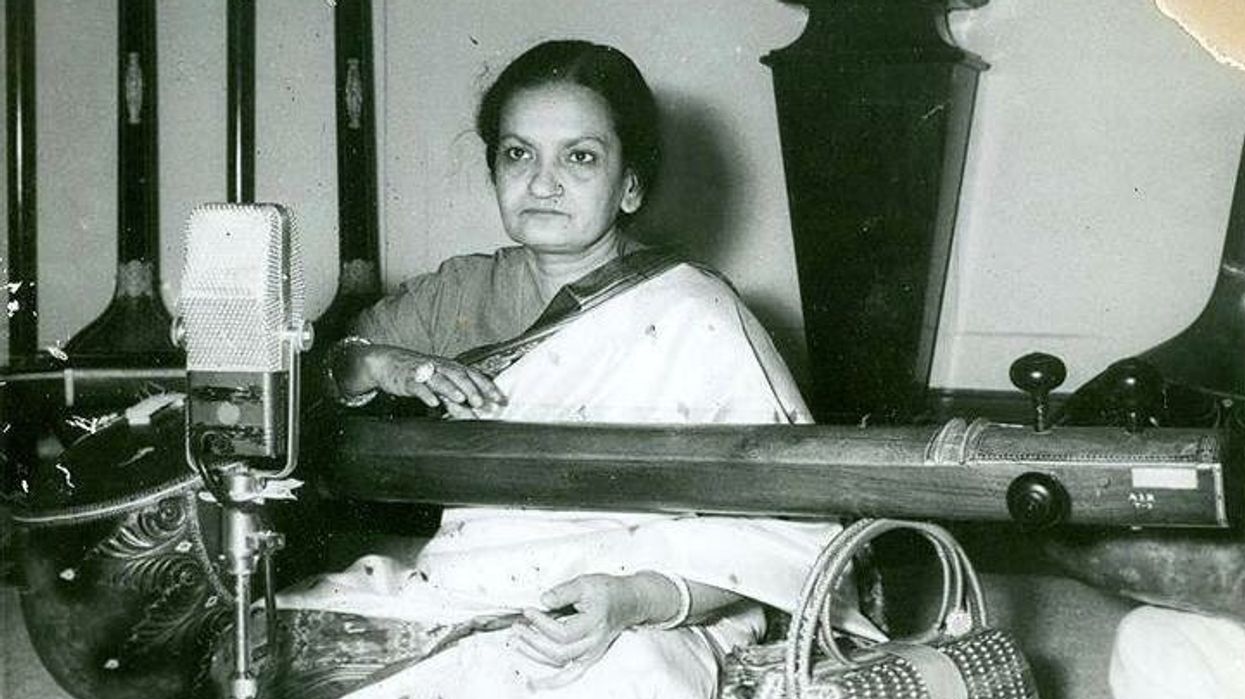LEGENDARY singer Begum Akhtar was hailed as the queen of ghazals, leaving behind a lasting legacy that continues to resonate with music lovers worldwide.
The late classical star elevated genres such as ghazal, thumri, and dadra while also breaking new ground in popular music. Her influence extended to inspiring great artists like Lata Mangeshkar, Mehdi Hasan, and Jagjit Singh. Born on October 7, 1914, she transformed a challenging childhood into a remarkable career that lasted until her passing at 60 on October 30, 1974.
Timeless songs such as Deewana Banana Hai To, Aye Mohabbat Tere Anjaam Pe Rona Aaya, Humri Atariya Pe Aao Sanwariya, and Wo Jo Hum Mein Tum Mein Qarar Tha cemented her status as an all-time great.
To mark her birth and the 50th anniversary of her death, Eastern Eye reveals some fascinating facts about the music maestro’s life.
Past pain: Born Akhtari Bai Faizabadi in 1914, she was the daughter of lawyer Asghar Hussain and his second wife, Mushtari Bai. Her father abandoned the family shortly after her birth. Akhtar endured a difficult childhood, including the loss of her twin sister, which had a profound impact on her. This personal pain would later be channeled into her music, where themes of love, loss, and longing became prominent.
Mother: Her mother, Mushtari Bai, was a courtesan and an acclaimed classical singer, who played a pivotal role in shaping Akhtar’s early musical journey, introducing her to some of the finest teachers of the time.
Prodigy: Akhtar displayed exceptional talent from a young age. She trained under classical masters, including Ustad Imdad Khan, Mohammad Khan, and Abdul Waheed Khan.
Debut: She gave her first public performance at the age of 15, earning high praise from the renowned poet Sarojini Naidu. This performance launched her career in classical music.
Pioneer: In 1935, at the age of 21, Akhtar became one of the first female artists to record a full-length album. Her early recordings were hugely successful, making her a household name and inspiring others to follow suit.
Revolutionary: Akhtar played a crucial role in transforming the ghazal from a poetic recitation to a popular musical genre. She blended classical Indian elements with rich poetry, revolutionising the genre.
Acting: Akhtar trained in acting with legendary Bollywood star Prithviraj Kapoor, who ran the successful Prithvi Theatre Company. This training enhanced her stage presence and contributed to her captivating performances.
Movies: Before focusing exclusively on music, Akhtar appeared in several Bollywood films. Her most notable role was in Mehboob Khan’s hit drama Roti (1942), where she was credited as Akhtaribai Fyzabadi and also sang several songs. Later, she appeared in Satyajit Ray’s acclaimed film Jalsaghar (1958), portraying the character of singer Durga Bai.
Comeback: In 1945, she married Lucknow-based barrister Ishtiaq Ahmed Abbasi, who forbade her from singing. This forced her to take a five-year break from music despite high demand for her performances. The hiatus led to emotional distress, and she eventually returned to music in 1949, recording songs that moved her to tears. After that, she never took another break.
Akhtar in the film RotiReverence: Known as the ‘queen of ghazals,’ she was also described as the ‘voice of pain’ for the emotional depth she brought to her music.
Fragrance: Akhtar was known to have a love for natural perfumes and maintained a large collection. She believed that fragrances enhanced the ambiance and mood during her performances.
Influence: Her singing style had a lasting impact on commercial Hindi cinema, with composers and singers like Lata Mangeshkar crediting her as a major influence.
Philanthropy: Akhtar was deeply involved in charity, performing at numerous concerts to raise money for worthy causes. Helping the less fortunate was one of her passions.
Passions: In her spare time, Akhtar enjoyed painting landscapes and portraits, though she never pursued it professionally. She was also an avid reader and had a deep love for Urdu poetry, which greatly enriched her emotionally charged and soulful performances.
Discipline: Despite her success, Akhtar maintained a strict regimen, including rigorous practice and specific dietary habits, to preserve the clarity and resonance of her voice.
Famous fans: Her influence extended to many music legends, including Lata Mangeshkar, Shubha Mudgal, Pankaj Udhas, Mehdi Hasan, Jagjit Singh, Farida Khanum, Parveen Sultana, Talat Mahmood, Rekha Bhardwaj, and Pandit Jasraj. Top artists attended her concerts as admirers, eager to learn from her mastery of the stage.
Awards: Her contributions were recognised with several honours, including the Padma Shri in 1968 and a posthumous Padma Bhushan in 1975.
Missing: Many believe that Akhtar’s finest masterpieces were never recorded, as she was at her best during live performances. Known for her improvisational skills, she delivered otherworldly renditions on stage that could not be replicated in a studio setting.
End: Her final concert took place in Ahmedabad in 1974. Despite suddenly falling ill during the performance, Akhtar completed the show before being rushed to the hospital. Sadly, she passed away just a few days later.
Legacy: Akhtar’s fame continued to grow posthumously, with numerous compilation albums released globally. Her recordings remain popular today, with millions of streams on platforms like Spotify and YouTube. On October 7, 2017, Google commemorated her 103rd birth anniversary with a dedicated doodle.
Books: Several books have been written about her life, including Begum Akhtar: The Story of My Ammi by Shanti Hiranand, In Memory of Begum Akhtar by Shahid Ali Agha, and Begum Akhtar: The Queen of Ghazal by Sutapa Mukherjee.




